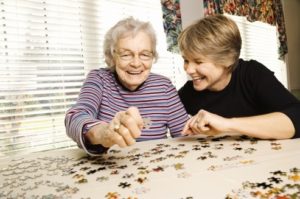A monthly article brought to you by Senior Services Memory Support Programs
When someone has dementia, their cognitive function may be declining, but they still have abilities and a desire for engagement. In fact, continuing to do as much as they can at their current ability level keeps them active and may even help them to maintain skills longer.
 There are four main reasons why activities are so important.
There are four main reasons why activities are so important.
- Slow the decline: As the saying goes, “use it or lose it”. Continuing to do as many activities and daily tasks as independently as possible will provide benefit to the person living with dementia. Instead of automatically helping someone with a task, we should adapt activities as needed to allow them to do as much as they can for as long as possible. This can help them retain abilities and stay active longer.
- Provide daily structure: People with dementia do best with a consistent daily routine. Having structure in the day gives needed predictability and stability when their mind is making them feel disoriented or confused.
- Provides a feeling of productivity: As dementia progresses, those living with dementia may be capable of less and often feel like a burden. Helping them participate in everyday tasks and activities can boost mood and improve quality of life.
- Reduce challenging behaviors: Activities can also reduce common behavioral expressions such as agitation, repetitive questions and anger. This can help to keep them engaged as well as giving them a way to use their energy in a positive way.
People at different stages of dementia may need a different level of assistance with activities. Overall, the goal of the activity is the process, not the outcome.
- Set-Up: Prepare the activity for your loved one. For example, help them brush their teeth independently by putting toothpaste on their toothbrush and placing it next to the sink.
- Supervision: When your loved one needs a little more help, set up the activity and then stay nearby, but encourage them to complete it on their own.
- Prompting: You may need to assist with prompting so that your loved one won’t become frustrated. If they get stuck, point out the next step, give them an item that’s needed or ask what the next action is.
- Direct Verbal Cues: If prompting is not enough, you may need to guide them with brief directions, allowing plenty of time to accomplish each step. For example: “Pick up the wash cloth…turn on the faucet…put cloth in the water…turn off the faucet…squeeze water out of the towel…wipe your face.”
- Physical Assistance: When your loved one is still physically able to complete the task, but needs physical help to do it, you can gently guide their actions. For example: if they were washing dishes, you could put your hand over theirs and guide them to gently rub the dish with the sponge.
When planning an activity for someone with dementia, take into account what they like to do now, what they used to enjoy doing in the past, what are they able to do, what they did for a career, what gives them purpose and what are they in the mood for?
Below are some activities that you can try.
Take a walk, plant flowers, water plants, feed the birds, sweep the porch, listen to music, look at photo albums, play dominoes, complete a puzzle, provide a hand massage, give a manicure, bake cookies, set the table, wash and dry dishes, put silverware away, clip coupons, string beads, make greeting cards, fold towels, tap a balloon, stretching exercises, flower arranging, play cards and so much more.
For more ideas, check out this resource: https://www.caregiverresource.net/tags/alzheimer-s-dementia.
When you start to notice memory changes, seeking early detection is key. Senior Services offers an array of memory support programs including confidential memory screenings to obtain a cognitive baseline, early memory loss programs, and educational classes along with support from Seasons Adult Day Health Services. If you or someone you know is experiencing increasing changes with their memory and could benefit from additional services, please contact Amy Sheridan, Family Support and Activity Manager at 989-633-3764.
Check out our section, Our Mind Matters, next month as we discuss conversation tips.

